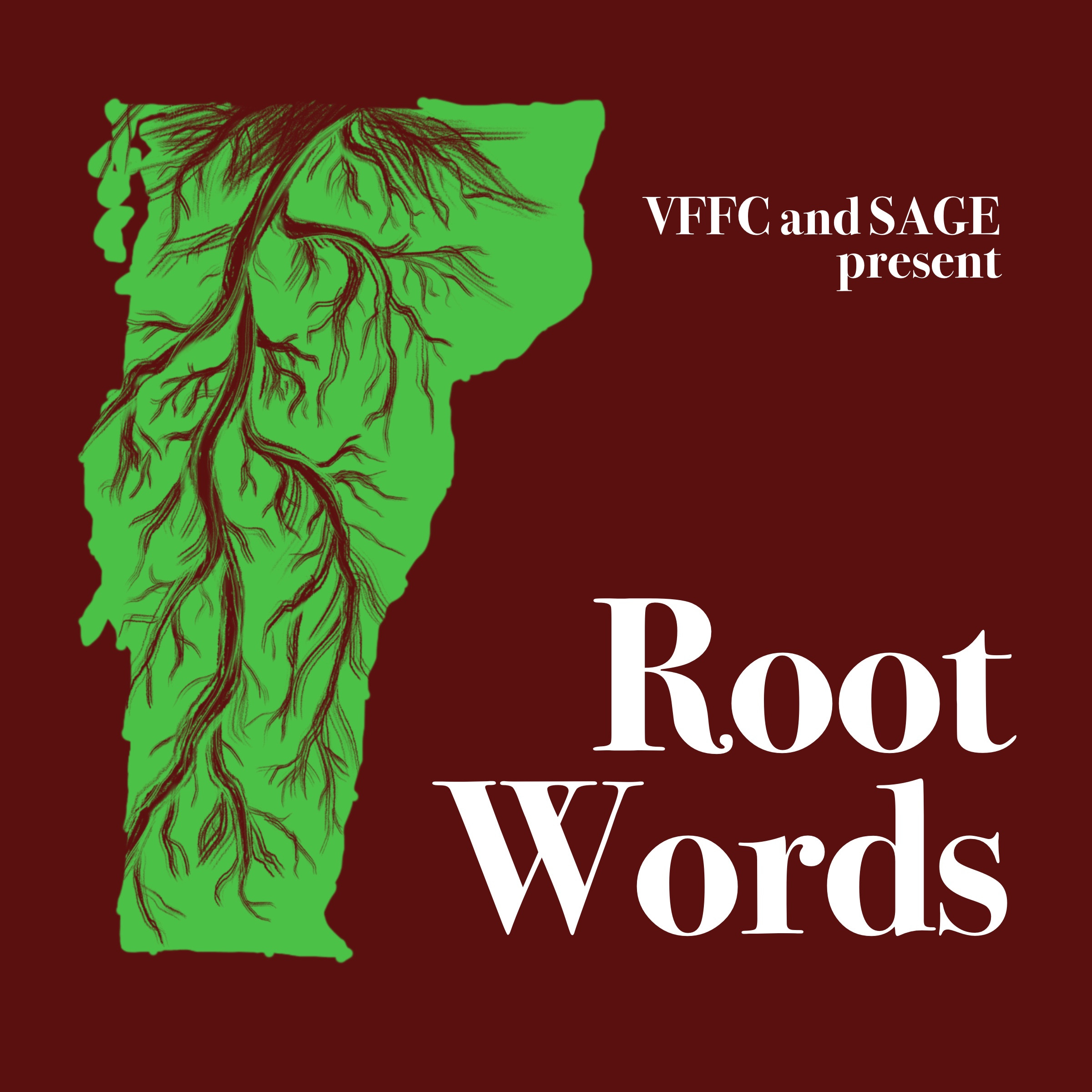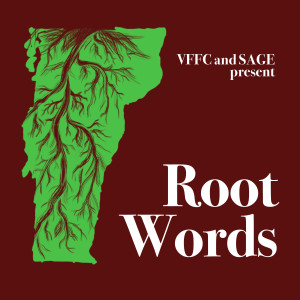
6.3K
Downloads
38
Episodes
Root Words showcases stories of how food and agriculture connect us with our community and our landscape.
Root Words is a collaboration between Vermont Farmers Food Center, Shrewsbury Agricultural Education & Arts Foundation, Shrewsbury Historical Society, WEXP, and many other community members. The project is based in Rutland County, Vermont.
Episodes

Monday Nov 20, 2023
Restoring Relationships
Monday Nov 20, 2023
Monday Nov 20, 2023
Welcome back to our third episode of a five-part miniseries exploring how a focus on local food builds relationships with people and the environment. If you haven’t followed this miniseries, you may want to go back and listen from episode 26, Localizing the Regional Food System.
In our last episode we explored the community food web, a local alternative to the globalized food system that centers our relationships with our communities and with the land.
In this episode, we look at some relationships that people have with their foodways and some of the impacts that are felt when these relationships are damaged. Then we’ll hear how some folks are restoring their communities’ relationships with the land and with each other. At the end, we’ll hear what Vermont Farmers Food Center is doing to help build back those community relationships in Rutland.
Steve Gorelick, Managing and Programs Director for Local Futures, believes that the globalized accumulation economy has isolated us from true community. Steve says that before globalization, our agriculturally based communities were inherently more interconnected, and that this isolation has many serious effects.
Farmer and Vermont Farmers Food Center founder, Greg Cox, believes that global agribusiness’ goal is yield, and that individual and community health has suffered in the wake of this approach.
Shane Rogers of Food Solutions New England, believes that social inequities have been exacerbated by an unaccountable global food system, and that communities are their own best experts for rebalancing the power dynamic that a globalized system creates.
Many communities that have been marginalized by the global yield-based economy are rebuilding their relationships with their foodways and creating more just systems while doing so. We have explored many of these stories on Root Words over the past few years.
In episode 4, Sugaring in Vermont, Vermont Abenaki chef Jessee Lawyer describes his experience practicing traditional indigenous maple sugaring. In episodes 10, 11, 15, and 16, We explore the Vermont Abenaki’s quest for food sovereignty and preservation of their cultural food traditions, and hear from some allies in these efforts.
In episode 18 Taking Space, Vermont RELEAF Collective, I spoke with Olivia Pena, founder of Vermont RELEAF Collective, a network by Black Indigenous, & People of Color advancing Racial Equity in Land, Environment, Agriculture, & Foodways. This Vermont BIPOC network amplifies and lifts marginalized voices, while building community and sharing opportunities around foodways and land stewardship.
If you haven’t listened to our older episodes, they show some real depth to our communities’ cultural and social practices around food, and they are worth a listen.
Instead of replaying a segment from one of these earlier episodes, I’d like to play a piece from an unaired interview I did with Rich Holshuh in October of 2021. Rich is a citizen of the Elnu Abenaki Tribe, and working on the Atowi project that hopes to create balance with communities and with place. Forced removal separated indigenous people from their land and foodways abruptly. This and the cultural genocide that followed makes it very difficult for indigenous people to maintain their relationship with place and with their food system. Rich’s Atowi project is doing some really amazing work in partnership with the Brattleboro Retreat Farm and SuSu ComUNITY farm to address this reality. Stay tuned for more on this work in future episodes of Root Words.
Many BIPOC organizations and networks are leading the way to reestablish relationships between communities and with place.
To learn about the work of Atowi and of SuSu CommUNITY Farm, check out atowi.org, and susucommunityfarm.org.
Here in Rutland, farmer and VFFC board president, Greg Cox feels that most people no longer know where our food comes from and we’ve been detached from our connection to place and to seasonal change because of it, resulting in poor mental and physical health for us as individuals and for our communities as a whole. Greg feels that communities can be saved by rebuilding economic viability, beginning with a local food economy. This belief led Greg and others to create the Vermont Farmers Food Center in 2012.
By focusing on seasonal community gathering around food, VFFC creates the space for authentic community connections and empathetic relationships between people and sets the stage for healing and restoration while reconnecting people to their home’s natural cycles and rhythms. By using local food as common ground, VFFC facilitates a place-based culture that engages the community.
Heidi Lynch is the executive director for Vermont Farmers Food Center. Under Heidi’s guidance, VFFC leads a grassroots effort to become more connected to community and place by gathering around local food.
A built awareness around our connections to nature and community through a local food web creates space for dialog, understanding, and healing. We are all connected to place by our food and to each other through our community food web. When you become a supporter of VFFC, you establish a local relationship with farmers, food producers, and community members. You establish a relationship with place. For more information on becoming a member of the community at VFFC, visit VFFC’s website at vermontfarmersfoodcenter.org.
Food is the heart of one of our most intimate relationships with nature. We have the opportunity to connect with the land, the farmers, and our community when we restore relationships through the foods we choose to eat. Through a shared sense of place we can build trust and start healing our relationships with each other.
Rebuilding trust and our relationships with each other and with the land we occupy creates a strong foundation for food web resilience, but in order to bring the food system home you need a physical place, and it needs to be big and accessible. On the next Root Words we’ll hear how a grassroots community effort worked to rescue an aging piece of the community’s industrial past.
This episode was produced by Stephen Abatiell and Julia Anderson.
Special thanks to Steve Gorelick, Shane Rogers, Rich Holshuh, Greg Cox, and Heidi Lynch.
To learn more, check out the Atowi project at atowi.org, and SuSu CommUNITY Farm at susucommunityfarm.org.
For more information on the community at VFFC, visit vermontfarmersfoodcenter.org.
This Root Words series has been underwritten by Windswept Farm and Rutland Fluoride Action.
Barry Cohen of Windswept Farm strongly supports VFFC and is very encouraged with the Food Hub plan. Barry says, “My farm as well as my partner, The Squier Family Farm, expect to use the food hub facilities with it benefiting our process and profit.”
The folks at Rutland Fluoride Action are dedicated to ending fluoridation of the Rutland City water supply, learn more at RutlandFluorideAction.org.
Root Words is produced in the heart of Rutland County Vermont and is made possible by generous support from listeners like you. You can support Root Words by visiting us Online

No comments yet. Be the first to say something!